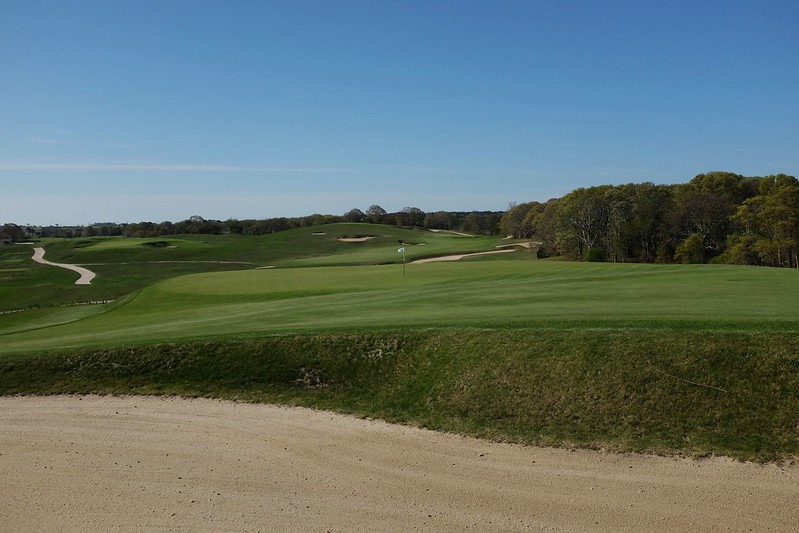I really enjoy a well-executed and designed blind tee shot. Used sparingly and in the right place, I find that a blind shot can add a lot of interest and a heightened level of excitement to a shot. A few of my favorite blind tee shots, off the top of my head, include:
The 10th at Myopia:


The 6th at Whippoorwill:


The 3rd at Old Macdonald:


The 8th at Old Town Club:


The 15th at Somerset Hills:


The 2nd at National Golf Links:


The 18th at Yale:


The 9th at Fishers Island:


The 5th at Sleepy Hollow, over a ridge, which leads to this view:

And perhaps my favorite of all, the 18th at Eastward Ho:


... to name a few. These are holes that stand out to me as being both blind and extremely enjoyable to play. To be honest, I am not sure what common factor, if any, makes me enjoy these holes so much and remember them so fondly. Perhaps its the delayed gratification of having to wait to see where your shot ended up. Maybe its the reveal of the hole and the landscape. Regardless, there's a place and a use for blindness off the tee, to be sure.
I am sorry to use the bandwidth, but I do it to emphasize my point.
Those are spectacular pictures of spectacular holes.
To think they could be improved by adding visibility is folly, hubris, and mainly ignorance.
"Learning", knowing, and "feeling" a golf course used to be important in competitive golf, and should be.
I get sick of hearing respected players, revered for their golf prowess and skill, discuss the "weaknesses" of blind shots.
Judgement, memory, and God forbid-preparation, are important skills in this jet in and play the mandatory Wednesday pro-am and that's enough prep era.
I hope the winner at Chambers Bay is someone out there prepping right now at the advice of our new Open Doctor, Mike Davis.
I recently played well in an event at a "quirky" old school course that I loved that was belittled by many in the field.
I myself had failed to qualify at the site 2 years ago in a different event due to unfamilarity with the course leading to poor execution.
This time I had seen it several times and was better prepared and much more familiar with its demands and "random" bounces.
There are many ways to prep for an event-pounding range balls off a flat lie under the watchful eye of Trackman can't become the end all be all of the outdoor game we all love.
I just read Golf World's recap of the Irish Open. In an attempt to be educational and respectful, they only get it half right and talk about the importance of being able to physically SEE the demands of a shot in order to create it, and that RCD lacks in that regard and that it's a negative that not even its spectacular setting can overcome.
Knowing what's over the hill via preparation, and being able to "see" it in one's MIND'S eye is an incredibly important skill, and is evidently a lost art amongst most well known players, and the author-presumably Jaimie Diaz-a frequent guest on my show-will be called out next time

)
Golf is not better for such blatantly lost imaginations, and it is a further slip down the slope of homogonization.